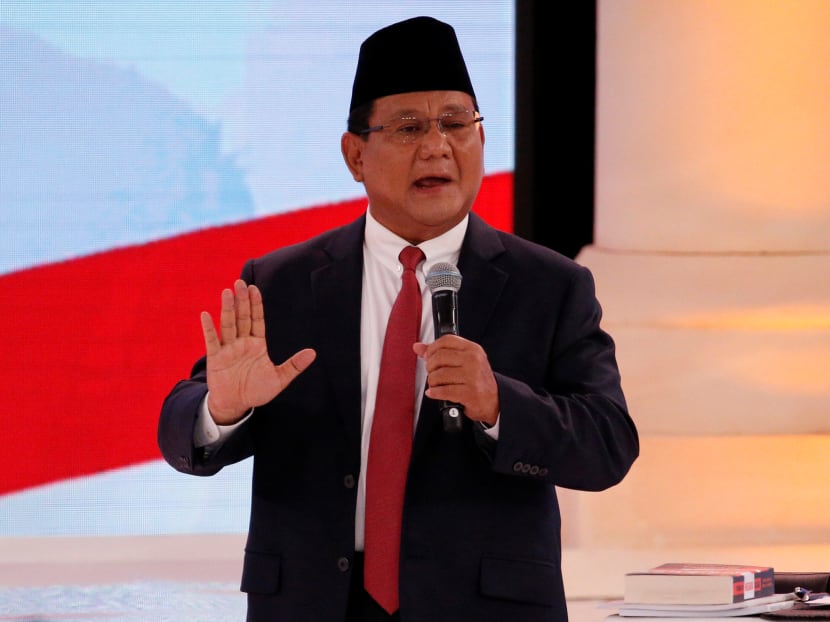Indonesian presidential candidate pledges to reclaim country’s ‘foreign-controlled wealth’
SINGAPORE — Indonesian presidential candidate Prabowo Subianto and his running mate Sandiaga Uno have vowed to “reclaim Indonesia's foreign-controlled wealth”, a campaign spokesman told Times Indonesia.

Indonesia's presidential candidate Prabowo Subianto gestures as he speaks during a debate with his opponent Joko Widodo (not pictured) in Jakarta, Indonesia, February 17, 2019.
SINGAPORE — Indonesian presidential candidate Prabowo Subianto and his running mate Sandiaga Uno have vowed to “reclaim Indonesia's foreign-controlled wealth”, a campaign spokesman told Times Indonesia.
In a report published on Wednesday (Feb 20), Mr Ferdinand Hutahaean cited as an example Singapore’s management of the Flight Information Region (FIR) over the Riau Islands. Another example he brought up was Hong Kong’s Hutchison Port Holding Group, which owns 49 per cent of the Jakarta International Container Terminal (JICT), located at the Tanjung Priok port in Jakarta. JICT is a subsidiary of state-owned port operator Pelindo II.
Read also
Mr Ferdinand urged the Indonesian government to take over the JICT “100 per cent” and not extend its contract with Hutchison, which is up for renewal.
He also refuted Pelindo II President Director Elvyn G. Masassya’s earlier comments that foreign co-operation in port management is widely practiced, adding that allowing Indonesia’s ports to be foreign-controlled is the “same as selling Indonesia to others”. “Foreign presence” in Indonesia’s ports could threaten the country’s maritime sovereignty, he said.
This is not the first time Indonesia has made known its wishes to take over control of the FIR above the Riau Islands, which has been managed by Singapore since 1946 as mandated by the International Civil Aviation Organisation (ICAO). It was reported by Indonesian media in 2015 that President Joko Widodo — who is seeking re-election against Mr Prabowo in the polls to be held in April — wanted to take over the FIR within three years.
In December 2017, Singapore rebutted claims made by two former top Indonesian air force officials regarding the Republic’s control of Indonesian airspace above the Riau Islands, adding that the duo had “misrepresented facts” in linking the issue to sovereignty.
In a letter posted on the Facebook page of Singapore’s embassy in Jakarta, Singapore’s ambassador to Indonesia Anil Kumar Nayar took issue with a call made by former Indonesian Air Force Chief of Staff Chief Marshal (Rtd) Chappy Hakim and Chairman of the Air Power Centre of Indonesia Air Vice Marshal (Rtd) Koesnadi Kardi for Indonesia to take back control of the FIR from Singapore. Mr Anil said the FIR is not an issue of sovereignty but instead, it is based on operational and technical considerations to provide effective air traffic control services. “The paramount priority is aviation safety. This complex issue is under the ambit of the ICAO, and involves other countries and international users of the busy airspace covered by the FIR,” he said.
He said it is not unusual for the air traffic authorities of one country to provide air traffic management services in the territorial airspace of another country. Citing Indonesia as an example, the ambassador said the country provides air traffic management services in airspace which belongs to other countries.
Singapore has repeatedly said that the FIR is not an issue of sovereignty, but of the safety and efficiency of commercial air traffic.
In November 2017, Singapore Prime Minister Lee Hsien Loong noted that Indonesian politicians have been talking about “taking back their airspace from Singapore” and the issue has unfortunately become politicised, making the problem harder to solve. Given that foreign relations may come under strain when national pride and sovereignty is involved, Mr Lee said this is why Singapore should take a “long term” approach when building diplomatic ties.






